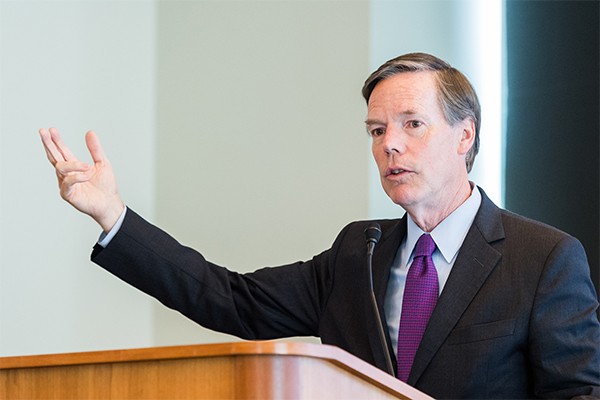DMSB Keynote Speaker Encourages MBAs, New Startups, and More – Boston News

Let’s explore some of the most interesting stories that have emerged from Boston business schools this week.
Life is Like a Venture Investment, Biotech Entrepreneur Tells Business Graduates – D’Amore-McKim Blog
The Northeastern University D’Amore-McKim School of Business selected biotech entrepreneur Dr. Gerald Chan as the keynote speaker at the DMSB graduation ceremony last month.
Dr. Chan, whose private investment firm Morningside Group funds “life sciences startups that are working to discover new ways to treat disease,” implored the assembled crowd at Matthews Arena to “live a life that makes themselves and their loved ones proud” even if “life can be at times so scary and at other times so exhilarating.”
Dr. Chan shared a personal anecdote about his father’s refusal to accept a job at casino on ethical grounds: “Had he accepted that offer, our family would have become financially richer. But because he acted on his ethical principles against his own economic interest, my family can stand tall today.”

D’Amore-McKim School of Business graduates, during last month’s ceremony / Photo via damore-mckim.northeastern.edu
You can read the full article here for a complete overview of the ceremony.
Winning Paper Shows Network Effects Fuel Business Value and Upend Strategy – Questrom School of Business Blog
BU Questrom School of Business‘ Marshall Van Alstyne recently co-authored new research that finds that “platform businesses” that depend on high numbers of users like Microsoft, Apple, Uber, Google, and Amazon scale much faster by moving value creation from “internal production to external orchestration.”
In “Platform Ecosystems: How Developers Invert the Firm,” Van Alstyne and his co-authors conclude that this approach will reverberate through “every part of a business, from marketing to operations to human resources.”
“Instead of a firm doing all its own marketing, consumers can add value through viral marketing. Instead of AirBnB incurring operating costs of a hotel stay, ecosystem partners bear those costs.”
“Instead of hiring employees inside the firm, platforms rely on freelancers outside the firm. In each of these instances, the value-creating activity shifts from inside to outside the firm. This shift affects all of the traditional business functions. It also has profound implications for fair division of wealth in society.”
You can read the full article here and the complete paper here.
25 MIT Startups To Watch – MIT Sloan Newsroom
On Saturday, September 8, Bill Aulet, Managing Director of the Martin Trust Center for MIT Entrepreneurship told the crowd at the MIT Kresge Auditorium, “We’re not just going to be doing another dating app.”
“We’re going to be doing things like addressing inclusion in society, making a more informed citizen throughout the world, cybersecurity, mental health, urbanization, improving ed-tech, improving health care. These are significant problems that the brightest people in the world should be working on, and those people are MIT students.”
The ambitions Aulet spoke about were created from the 25 startups built within the MIT delta v accelerator, which you can check out here.
The Case for Business Curiosity from Harvard, and More – Boston News

Let’s explore some of the most interesting stories that have emerged from Boston business schools this week.
The Business Case for Curiosity – Harvard Business Review
Harvard Business School Professor of Business Administration and Behavioral Scientist Francesca Gino recently published an article in the Harvard Business Review in which she elaborated on the “benefits of and common barriers to curiosity in the workplace.”
Professor Gino points to research, which offers “three important insights about curiosity as it relates to business”
- Curiosity is essential to the performance of an enterprise, leading to “fewer decision-making errors, more innovation, reduced group conflict, and more-open communication and better team performance.”
- By “making small changes” to organization and management, leaders can do more to encourage their employees’ curiosity
- Leaders fear curiosity “will increase risk and inefficiency.”
To address these three insights, Professor Gino offered “five strategies that can help leaders get high returns on investments in employees’ curiosity and in their own”:
- Hire for curiosity.
- Model inquisitiveness.
- Emphasize learning goals.
- Let employees explore and broaden their interests.
- Have “Why?” “What if…?” and “How might we…?” days.
She concludes, “Maintaining a sense of wonder is crucial to creativity and innovation. The most effective leaders look for ways to nurture their employees’ curiosity to fuel learning and discovery.”
You can read more about the business curiosity research here.
Occasional Breaks Can Make Groups Smarter – Questrom School of Business News
BU Questrom’s Jesse Shore recently co-authored new PNAS research, which finds that scientists who integrate “short breaks into problem-solving sessions improves both the average performance of the group and increases the likelihood of getting the best solution.”
The study, which was co-authored by Harvard’s Ethan Bernstein and David Lazer, has “implications for the way we use always-on collaboration software, such as Slack and Google Docs.”
Shore explains, “In many of these [collaborative software tools], the goal seems to be to keep people constantly aware of what others are doing. But the reality is that if you’re getting an alert every time something happens and you’re not taking the time to work separately and have your own independent thoughts, it may hurt the group’s overall ability to solve complex problems.”
You can find the full article here.
Sound Advice: Marketing Students Help Sonos Better Understand Its Customers – Suffolk Experience
The Suffolk Experience recently highlighted Sawyer Business School marketing research collaboration with Sonos, a “go-to source for high-quality home sound systems” that just so happens to be within walking distance of campus.
To accommodate the prediction that over “50 percent of all searches worldwide will be done by voice within four years,” Sonos had thrown its hat in the voice-assistance ring with Apple’s HomePad, Amazon Echo, and Google Home. The company reached out to Sawyer to better understand how late millennial 18-to-24-year-old consumers interact with voice-assistant speakers.
Sonos Consumer Insights Manager Dennis Brosnan writes, “Sonos likes working with Sawyer Business School students because the analysis and recommendations they present are often different than the approach we would take.”
You can read more about the Sonos research here.
MIT Announces 9 African Startup Challenge Finalists, and More – Boston News

Let’s explore some of the most interesting stories that have emerged from Boston business schools this week.
These 9 African Startups are Working Toward a More Inclusive World – MIT Sloan Newsroom
MIT Sloan recently announced the nine African startup finalists of The Initiative on the Digital Economy’s Inclusive Innovation Challenge, all of which use technology to “reinvent the future of work.”
Initiative Director Erik Brynjolfsson writes, “If we employ inclusive innovation globally, it could be the best thing that ever happened to humanity. We can have more wealth, better health, and widely held prosperity.”
Here are the 9 African finalists:
- Wefarm provides a “mobile network accessed through SMS, where millions of small-scale farmers can share information.”
- PrepClass connects students and tutors.
- Wesabi connects “skilled laborers to individuals and businesses.”
- Lynk is an “online platform that operates as a hiring service and also a showcase for artisans.”
- Brave Venture Labs provides “talent sourcing software for growing companies.”
- Moringa School “teaches software development and offers professional skills training.”
- Safi Organics “provides small-scale farmers with affordable fertilizer for their crops.”
- Solar Freeze “offers mobile cold-storage units for small farmers to help reduce crop spoilage.”
- AgroCenta is a “digital platform for rural, small-scale farmers to connect with buyers and access financial services.”
The finalists, who will travel to Nairobi, Kenya in late August to “pitch their ideas at a regional competition,” were selected from almost 200 entrepreneurs from 16 countries.
You can read more about the African startup contenders here.
Collaborate, But Only Intermittently, According to New Study by Harvard Business School Professor and Colleagues – Harvard Business School News
HBS has published new PNAS research, which suggests that always-on technologies like Slack, email, and social media are less effective at complex problem solving than “intermittently on.”
HBS’s Ethan Bernstein, along with BU Questrom’s Jesse Shore, and Northeastern’s David Lazer believe their research could have widespread implications on the workplace, such as “alternating independent efforts with group work over a period of time to get optimal benefits.”
Bernstein writes, “As we replace those sorts of intermittent cycles with always-on technologies, we might be diminishing our capacity to solve problems well.”
You can read more about the research here.
Sizing up Markets, Peering into the Future – Carroll School News
BC Carroll recently hosted its annual Finance Conference in which financial experts delivered a surprisingly “upbeat forecast” on global investment, tech innovations, and cryptocurrencies.
Of the conference’s goals, John and Linda Powers Family Dean Andy Boynton ’78 writes, “We want our students to become lifelong learners, people who look for ideas in many different places. We want them to think both deeply and broadly, and to become great leaders for the future.”
Despite the relative stasis of the larger economy, Harvard’s Kennedy School of Government Professor Nicholas Burns ’78 described this particular moment in American history “consequential” and “chaotic” from a global economy standpoint.
Burns explains that “high on his list of global challenges for the United States is the rising dominance of nations to the East, especially China and India,” particular when the U.S. has not employed “skillful diplomacy and strategic thinking” to accommodate this “coming shift in global power.”

Nicholas Burns (’78), speaking recently at BC Carroll / Photo via bc.edu
He said, “There’s no question that by the next century, we’ll be a Pacific world,”
You can read more about the conference here.
Employee Surveillance, Startup Contests, and More – Boston News

Let’s explore some of the most interesting stories that have emerged from Boston business schools this week.
The Surprising Effects of Employee Surveillance – Questrom School of Business Blog
BU Questrom School of Business professor Michel Anteby recently co-authored new research that explores the ways in which increased surveillance of employees can lead “to workers’ strikes and sometimes even quitting their jobs altogether.”
The article points to a 2011 experiment where TSA managers installed cameras to monitor officers “as an attempt to stop the disappearance of baggage in airports.” According to TSA officers, they felt they “as though their managers were merely looking for a reason to discipline them.”

New BU research finds that workplace scrutiny often leads to a worse work environment, even if it is inadvertently / Photo via bu.edu
According to Anteby’s research, “under such scrutiny, one tends to lose sight of the bigger picture, which ends up with employees feeling undervalued and over scrutinized.”
You can read the full article here.
These 12 European Startups Are Using Technology to Improve Opportunities For Low-And Middle-Income Workers – MIT Sloan Newsroom
The MIT Initiative on the Digital Economy’s Global Inclusive Innovation Challenge announced its 12 European finalists, all of which are working to improve economic opportunity for workers. According to the article, “the competitors are judged on vision, impact, participation, and scalability.”
Initiative Director Erik Brynjolfsson writes, “If we employ inclusive innovation globally, it could be the best thing that ever happened to humanity. We can have more wealth, better health, and widely held prosperity.”
According to the article, the European finalists will travel to “Darmstadt, Germany, in early September, where they will pitch their ideas at a regional competition. The winner of each category then goes on to compete in November during the Global Grand Prize Gala at MIT. The gala includes four $250,000 prizes, one for each category.”
The 12 European finalists, organized by category, are as follows:
Skills Development and Opportunity Matching
- Data4You, an all-ages coding boot camp.
- Jobiri, which “assists people with finding jobs through an AI-driven career adviser.”
- micro:bit, which “provides tiny programmable computers for students and teachers.”
Income Growth and Job Creation
- ABURY’s “Design meets Craft” connects “designers and artisans through a digital platform to find creative project partners, and connect with the global market.”
- mecasa is an “online platform connecting caretakers with senior individuals who need daily support.”
- ProGlove is a “smart glove designed to scan and streamline manufacturing and logistics work.”
Financial Inclusion
- hiveonline is a “mobile platform offering small- and micro-businesses administrative help and access to financial services.”
- Trezeo, which “provides a mobile financial platform for independent workers.”
- Sherpa, which “offers insurance to people who are self-employed, freelancers, contractors, and other entrepreneurs.”
Technology Access
- BLITAB, a “tactile tablet designed for blind and visually-impaired users.”
- Pangea Electronics “builds sustainable and eco-friendly technology.”
- Teqmine Analytics uses “AI to help customers with their research and development questions.”
You can read more about the event here.
Think You’re Having a Heart Attack? If You’re a Woman, Insist on a Female Physician – Harvard Business School News
New PNAS research co-authored by HBS Associate Professor Laura Huang, along with the University of Minnesota-Twin Cities’ Brad Greenwood and Washington University in St. Louis’ Seth Carnahan finds that of “more than 500,000 heart attack patients admitted to hospital emergency departments in Florida between 1991 and 2010, female patients treated by male physicians were less likely to survive than patients of either gender treated by female physicians or male patients treated by male physicians.”
Moreover, “survival rates among female patients treated by male physicians improved with an increase in the percentage of female physicians in the emergency department and an increase in the number of female patients previously treated by the physician.”
In “Patient-Physician Gender Concordance and Increased Mortality Among Female Heart Attack Patients,” the researchers write:
“These results suggest a reason why gender inequality in heart attack mortality persists: Most physicians are male, and male physicians appear to have trouble treating female patients. If female patients tend to be more challenging for male and female doctors to diagnose and treat, the patterns we document may reflect the fact that the most skillful physicians (i.e., female physicians) provide the highest return to their skills when treating the most challenging patients (i.e., female patients).”
You can read more about the research here.
Religious Spending, Taking Risks, and More – Boston News

Let’s explore some of the most interesting stories that have emerged from Boston business schools this week.
Shoppers with Strong Religious Beliefs Spend Less and Make Fewer Impulse Purchases – Harvard Business Review
The Harvard Business School recently published an article in the Harvard Business Review that illuminates a fascinating correlation between grocery spending and religiosity—as the latter rises, the former falls.
The researchers write, “We found that for each 20 percent increase in the number of religious adherents in a county, annual grocery sales per store decreases, on average, by about $125,000. [Our] results showed that shoppers living in more religious U.S. counties spent less money on groceries and also made fewer impulse purchases than those living in less religious U.S. counties.”
The implications of the research are vast and wide reaching, particularly for retailers. They explain further:
“Because being reminded about God increases shoppers’ frugality, they may be more sensitive to price discounts and promotions (such as “buy one, get one free”) around the time of religious holidays and observances. Getting a good deal, particularly on an impulse buy, is likely to alleviate shoppers’ heightened frugality.”
The researchers also speculate that “retailers may also allay religious shoppers’ concerns about being frugal by offering deals that demonstrate respect for their values, such as promising to donate a percentage of revenue from a particular product to a local charity.”
You can check out the full article here.
When Regulation Doesn’t Throttle Risk-Taking – Questrom School of Business Blog
New Management Science research from Questrom School of Business Accounting Professor Ana Albuquerque and Fudan University’s Julie Lei Zhu finds the positive impacts of the 2002 Sarbanes-Oxley Act (SOX), which required companies to implement internal controls on financial reporting.
According to the article, “not only did filing firms not decrease their investment activities, some measures suggested that firms actually increased their investments after the reporting requirements were put into place. Filing firms also appeared to benefit in other ways. Banks typically offered filing firms larger loans with lower collateral requirements compared to non-filing firms.”
Albuquerque writes, “Credit terms improved [for filing firms], because they were disclosing more information. The benefit was higher than the cost of compliance.”
You can read more here.
These 12 startups are Re-Imagining the Latin American Workplace and Workforce – MIT Sloan Newsroom
MIT Sloan recently announced the 12 Latin American finalists of the its global Inclusive Innovation Challenge, all of which will travel to São Paulo, Brazil in just a few weeks “where they will pitch their ideas at the IIC Latin America Celebration.”
According to the article, “the winner of each category then goes on to compete in November during the Global Grand Prize Gala at MIT. The gala includes four $250,000 prizes, one for each category.”
Initiative Director Erik Brynjolfsson writes, “If we employ inclusive innovation globally, it could be the best thing that ever happened to humanity. We can have more wealth, better health, and widely held prosperity.”
Here’s a quick overview of each of the 12 Latin American finalists:
- Interacpedia “connects university student teams with organizations to generate the development of new skills/jobs and opportunities.”
- Signa is a “platform that provides deaf people with online digital economy courses.”
- Sumá is a “fair marketing platform that connects family farmers with food buyers.”
- Alò Bodega is a “mobile app for Latin American and Asian corner stores.”
- Apli is an “artificial intelligence-enabled jobs marketplace.”
- Incluyeme is an “online job portal for people in Latin America with disabilities.”
- Grupo Nueva Economía is “developing new digital channels for small businesses and entrepreneurs.”
- Outbound Initiative “connects innovators from underrepresented regions — in this case Brazil — with business opportunities using data-combing artificial intelligence.”
- RedeDots is a “social network of more than 220,000 people engaged in the fair trade and sustainable business market.”
- LEVEE “uses machine learning, geolocation, and mobile messages to connect people with job opportunities.”
- Trocafone “aims to reduce e-waste by creating a marketplace for used electronics.”
- UnDosTres “offers Mexico residents mobile payment for services like prepaid cellphone recharging, movie ticket purchases, electricity, and phone bills.”
You can read more about the startups here.
Managing a Personal Crisis, and More – Boston News

What’s going on in Boston this week?
How to Manage an Employee Who’s Having a Personal Crisis – Harvard Business Review
The Harvard Business Review recently explored how managers can best support employees to “take care of themselves emotionally while also making sure they are doing their work.”
Annie McKee, author of How to Be Happy at Work and a senior fellow at Penn’s Graduate School of Education, offers three helpful suggestions:
- Set a tone of compassion in the office. It will not only give your employees confidence to approach you with struggles, but also give you the ability to spot warnings signs.
- Be creative with solutions. A flexible schedule may allow a person to maintain their output without much disruption.
- Check in from time to time, both to reassure the employee and to make sure that further adjustments or accommodations aren’t needed.
You can read the full article over at HBR.
Agile at Scale, Explained – MIT Sloan Newsroom
MIT Center for Information Systems Research’s Kristine Dery is currently studying how agile management—the increasingly popular management methodology adopted by the likes of Microsoft, Ericsson, and Spotify—relates to the employee experience.
MIT Sloan School of Management senior lecturer and industry liaison Carine Simon writes, “The traditional method of managing, the waterfall method, which is very inflexible, planned-in-advance, linear, and not iterative at all, wasn’t lending itself at all to the flexibility and the adjustments that were necessary to make great software.”
Simon adds, “[Agile is] iterating with customer feedback, prototypes, and tests, versus taking some requirements and issuing the product maybe a year later, when the customer’s requirements have changed or technology has evolved.”
Many companies have taken note of agile’s prevalence and begun to “ask whether the method’s practices and philosophies could be scaled up to apply with equal success to other projects or even entire business functions,” according to Simon and Dery.
Simon continues, “In customer-centric processes where customer input is key, and in that sense it’s quite uncertain or fast-changing, then those would be the types of areas in a firm that lend themselves to agile.”
Check out the full article here.
Questrom Professor Named 2018-19 Batten Fellow – Questrom Blog
BU Questrom School of Business‘ Siobhan O’Mahony was recently awarded a 2018-19 Batten Fellowship by the Batten Institute for Entrepreneurship and Innovation at University of Virginia Darden School of Business.
The Batten Fellows program, according to Darden, “provides support for prominent thought leaders and high-potential scholars who seek to generate new knowledge about entrepreneurship and innovation.”
O’Mahony, an Associate Professor of Strategy & Innovation and Academic Director of Research and Curriculum for Innovate@BU, explores how “technical and creative projects organize for innovation.”
O’Mahony plans to use her fellowship to “research entrepreneurial ecosystems and how those systems influence entrepreneurs and their efforts around venture creation.”
Read all about O’Mahony’s fellowship as part of the full article here.
